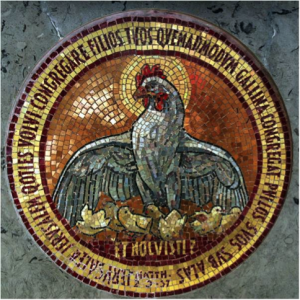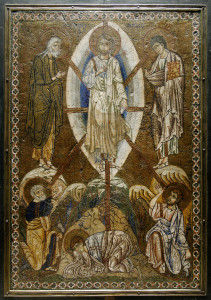 My mother grew up in the outskirts of Madison, Wisconsin, the second of four children. She had a happy childhood, but her family, like all families, had moments of discord. The moments of discord that I’ve heard the most about involved Oscar Mayer Smokie Link Sausages.
My mother grew up in the outskirts of Madison, Wisconsin, the second of four children. She had a happy childhood, but her family, like all families, had moments of discord. The moments of discord that I’ve heard the most about involved Oscar Mayer Smokie Link Sausages.
Why would Smokie Link Sausages cause such distress in my Mom’s family? You have to understand that Smokie Link Sausages were, according to my Mom and her siblings, the most delicious thing ever offered for dinner. And you also have to understand that a package of Oscar Mayer Smokie Link Sausages contained exactly eight sausages. There were 6 people in the family. So each person started with one sausage, but then there were two extra sausages. The burning question: who would get to eat them?
My grandparents, probably exhausted from dinnertime bickering, devised an ingenious solution. Each time the family sat down to eat Oscar Mayer Smokie Link Sausages, one of the four children was given the task of cutting up the two extra sausages into six pieces, one for each family member. And here’s the trick: the person who cut up the sausages got the last sausage piece left on the plate after everyone else had picked whichever one they wanted. Think about that. I cannot tell you how many times I have heard how carefully those kids cut those sausages; how they tried to account for the curve at the end of the sausage, moving the knife a millimeter one way or another, so that when the last piece was left, they would have an exactly equal portion of Oscar Mayer Smokie Link Sausage.
You may be wondering what Oscar Mayer Smokie Link Sausages have to do with the Church of Christ in Corinth.
The trouble in Corinth started when the people began to focus on the differences among them. They looked at one another and saw that each person was playing a different role in the community; that each person had different gifts to offer to the community. This shouldn’t have been surprising. It’s true of every community, all the time. But for some reason, at this moment in the life of this church, all these differences brought about discord. Everyone began to argue about which roles were more valuable and which gifts were most important. Is it more important to be an evangelist or a teacher or a healer or a helper or a leader or a prophet? Is it better to work miracles or speak in tongues or perform deeds of power?
Underneath all of the churchy language, this is a Smokie Link Sausage kind of problem. What the people of Corinth really want to find out is how they compare to their fellow community members. They’re concerned that God may have gifted some more generously than others. They’re concerned that the church may have honored some more than others. Deep down, they’re concerned about themselves. What about me, the Corinthians wonder. What about me? Am I getting enough love and attention? Is there enough delicious Smokie Link Sausage for me?
Now the Church of Christ that gathers in this building is quite different from the Church in Corinth and quite different from my Mother’s family of origin. I’ve never heard anyone arguing here about the relative importance of the gift of tongues or deeds of power. I’ve never heard anyone arguing about how to divide Oscar Mayer Smokie Link Sausages.
In general, I would say that we do pretty well treasuring one another’s differences and sharing what we have in common. And the past few years have been a time of abundance – which often makes tolerating differences and sharing common goods easier. There is vibrancy and new possibility in our ministries. We are growing – not only in people and participation but also in courage and creativity. You’ll have to read the annual report or come to the annual meeting to get the full picture – please, read the annual report and come to the annual meeting.
This has been a time of great abundance in our life together. We are growing in beautiful ways. But along with growth comes growing pains. Growing takes time, and work, and energy. Growing takes constant adjustment of our practices and assumptions. Growing means making room for new people and new ideas. Growing, even in the most positive and life-giving ways, also means loss – the loss of what used to be.
All this growth, all these growing pains, can prompt us to ponder those same questions that the faithful in Corinth were asking. Do my presence and my gifts and my preferences still matter, in a more bustling community? Will there be enough delicious Smokie Link love and esteem in this community for me?
Something else has been happening here, too. In this time of abundance and good, hard growth, we’ve also been talking about what to do with our meeting house. It all started back in 2013 when we faced the fact that we needed to paint the exterior of this building and replace the roof – items well outside our yearly budget. Then we began to wonder about the Pine Street Steps, which require yearly repair. The wood in the windows above the Pine Street steps needed work recently too, and in the process of getting that work done we found out that the whole window structure was unstable. The doors have non-standard frames, and they need to be replaced. When do temporary fixes become more expensive than tackling a redo?
Once you start thinking about a significant renovation, of course, plenty of new ideas emerge. We want any significant work on our building, especially a 125th anniversary project, to reflect who we are. We want to make this building more environmentally friendly, reducing our energy costs and caring for creation. We want our sanctuary to be fully accessible, allowing everyone to worship and to lead. And what about the kitchen?
The more we’ve talked, the more ideas have emerged, and for two years we’ve been brainstorming and setting priorities and weighing options. This process has brought our attention to the fact that we are different from one another, just like the faithful in Corinth. Each of us has different opinions about what and how much should be done to this building, this beloved place of worship and service and fellowship that both expresses and supports our ministry. Each of us has different opinions, and each of us plays a different role in the process of discernment, too: the fiscal conservative and the entrepreneurial risk-taker. The detail-oriented planner and the prophetic dreamer. The folks who rush change, the folks who slow change, and the folks who just haven’t been able to bring themselves to pay attention to the process yet at all – I know you’re out there, and we really need to know what you think, too. This concerns you.
All these differences can make us wonder (if only subconsciously): What about me? Are my priorities and my wisdom being honored? Is there enough love here for me and my gifts?
Yes. I say yes. And I am not alone. The apostle Paul says yes. God says yes.
You are important. Each one of you is precious beyond measure. You have been richly gifted by God. You have something to offer, and this community has something to receive from you. Each of you; each of us; new to the community and old-timers; young and well-seasoned; established in leadership or hoping to avoid it; dying for a good debate or trying to escape any whiff of conflict; passionate about construction or barely able to pay attention. You are important. You are precious beyond measure. You have been richly gifted by God. You have something to offer, and this community has something to receive from you.
This is not an Oscar Mayer Smokie Link Sausage situation. There’s not a limited amount of something to be split up, fairly or unfairly.
We are the body of Christ, and individually members of it. And God has appointed all kinds of people, with all kinds of gifts, to be a part of that body. If one of us suffers, all suffer together. If one of us is honored, all rejoice together. Love is multiplied rather than divided among us.
We in the body of Christ disagree, because we are different people who care passionately about our common life. And when we disagree, God shows us that disagreement can bear beautiful fruit if only we remember that we belong to one another. God calls us towards a still more excellent way. That more excellent way isn’t pretending to agree, or deciding who had the best idea, or trying to divide everything equally. God calls us towards a still more excellent way: which is always a new way, a way we create together, a way that is better because of each person who helped to shape it, and so much better than the way any one of us would have chosen by ourselves.
God of grace and God of glory, we come to you in the midst of abundance, in the midst of good and hard growth, on the verge of exciting and sometimes daunting possibilities. We pray with gratitude for those precious, beloved, people all around us, who bring different gifts and different wisdom than we do. We pray for open hearts and minds, that we might treasure what they offer, and together seek a still more excellent way. Let us not be afraid, but rather rejoice for in your Spirit we are all members of the same body; and before us all you have spread an amazing feast of life. There are so many sausages! There is French toast and fruit salad. There is more than we could ask or imagine. Thank you, Thank you, thank you. Alleluia. Amen.









